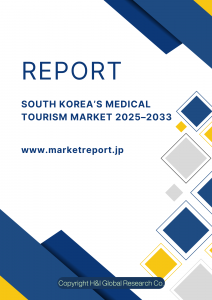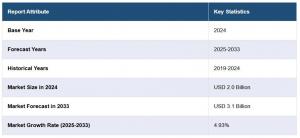New Report Analyzes South Korea’s Medical Tourism Market 2025–2033 : Advanced Care and K-Wave Fuel Demand
Growing demand for cosmetic, fertility, and affordable treatments to push South Korea’s medical tourism market to USD 3.1B by 2033.
TOKYO, JAPAN, June 3, 2025 /EINPresswire.com/ -- The South Korea medical tourism market reached a value of USD 2.0 billion in 2024 and is projected to grow to USD 3.1 billion by 2033, expanding at a compound annual growth rate (CAGR) of 4.93% between 2025 and 2033. This steady growth is attributed to South Korea’s advanced medical infrastructure, affordable treatment options, and its increasing global reputation for excellence in healthcare delivery.Defining Medical Tourism and Its Relevance to Korea
Medical tourism involves traveling across international borders to obtain medical care that is either unavailable, too expensive, or less advanced in one’s home country. Patients typically seek cosmetic, orthopedic, cardiovascular, ophthalmic, dental, and bariatric treatments, as well as advanced procedures like fertility therapy, gender reassignment, and stem-cell transplants.
South Korea has positioned itself as a leading medical tourism destination by offering not only world-class treatments but also integrated services that enhance patient experience and convenience. In addition to improving individual health outcomes, medical tourism contributes to the national economy by creating healthcare-related jobs, encouraging knowledge exchange, and increasing foreign revenue.
Market Drivers and Emerging Trends
One of the primary forces driving South Korea’s medical tourism market is the steady influx of inbound patients seeking high-quality and cost-effective care. South Korea is internationally recognized for its state-of-the-art hospitals, cutting-edge equipment, and medical professionals trained in both local and global institutions. Patients from regions such as China, Russia, the Middle East, and Southeast Asia frequently travel to Korea for services that may be more expensive or less accessible in their own countries.
Elective medical procedures—particularly those not covered by insurance—represent a fast-growing segment of demand. These include fertility treatments, cosmetic surgeries, gender affirmation procedures, and dental reconstructions. South Korea has emerged as a leader in these areas, especially in cosmetic and plastic surgery, with many patients drawn by the country's reputation for natural-looking outcomes and clinical safety.
The South Korean government has been a key enabler of the medical tourism industry. Through the Ministry of Health and Welfare (MOHW), policies have been introduced to safeguard the interests of international patients. Two notable measures are the mandatory registration of medical institutions that serve foreign patients and the requirement for medical malpractice liability insurance—both of which aim to reinforce patient safety and institutional accountability.
In addition to regulation, the government and healthcare providers have launched comprehensive medical tourism packages, which include hospital care along with logistics such as flight booking, accommodation, translation services, and post-treatment care. These packages appeal to foreign patients by offering a seamless and stress-free experience, which is especially important when undergoing elective or complex treatments abroad.
A growing trend shaping the market is the integration of wellness and traditional Korean medicine (TKM) with modern healthcare services. Patients increasingly seek holistic healing experiences that combine evidence-based Western practices with centuries-old Korean approaches such as acupuncture, herbal therapies, and balance-oriented treatments. This fusion offers a unique value proposition for medical tourists seeking both physical and mental rejuvenation.
Market Segmentation
The South Korea medical tourism market is segmented by type and treatment type, enabling a granular analysis of growth areas and patient preferences.
By Type:
• Inbound: Refers to international patients traveling to South Korea for treatment; the dominant segment.
• Outbound: Involves Korean nationals traveling abroad for care.
• Intrabound: Refers to domestic patients traveling within Korea for specialized treatment, though this segment is less relevant to international medical tourism.
By Treatment Type:
• Cosmetic Treatment: Includes procedures such as plastic surgery, dermatology, and anti-aging therapies.
• Dental Treatment: Covers implants, orthodontics, and full-mouth restorations.
• Cardiovascular Treatment: Encompasses bypass surgery, stents, and heart diagnostics.
• Orthopaedic Treatment: Includes joint replacement, spine surgery, and sports injury management.
• Bariatric Surgery: Weight-loss surgeries such as gastric bypass and sleeve gastrectomy.
• Fertility Treatment: Covers IVF, ICSI, egg/sperm donation, and reproductive endocrinology.
• Ophthalmic Treatment: Includes LASIK, cataract surgeries, and retinal procedures.
• Others: Includes oncology, stem-cell therapy, neurology, and more specialized procedures.
Among these, cosmetic and fertility treatments are particularly popular among international visitors due to South Korea’s advanced clinical expertise and high success rates.
Government Initiatives and Policy Support
The success of South Korea’s medical tourism sector is closely linked to governmental support and policy development. In addition to regulatory protections, authorities have invested in marketing campaigns, international expos, and medical tourism platforms to raise awareness and build credibility. The Korea Health Industry Development Institute (KHIDI) and other agencies have played active roles in coordinating with hospitals and travel providers to ensure service quality and patient satisfaction.
Efforts are also being made to digitize the patient journey, including pre-travel teleconsultations, electronic medical records in multiple languages, and AI-assisted diagnostics. These improvements reduce barriers for patients and increase trust in Korea’s healthcare ecosystem.
Future Outlook
Looking forward, South Korea is expected to maintain its position as a top-tier medical tourism hub in Asia. Opportunities for growth include further leveraging digital health tools, targeting new inbound markets such as Europe and the Americas, and expanding into adjacent sectors like wellness retreats, mental health recovery, and preventive medicine.
Moreover, continued emphasis on sustainability, cultural hospitality, and patient-centered care is likely to differentiate South Korea from competing markets. With a projected market value of USD 3.1 billion by 2033, the sector remains ripe for investment, innovation, and strategic partnerships.
※For more details, please visit:
South Korea’s Medical Tourism Market 2025–2033
https://www.marketreport.jp/eng/south-korea-medical-tourism-market-2025/
※About H&I Global Research
Founded in 2009 and headquartered in Tokyo, Japan, H&I Global Research Co., Ltd. is a prominent provider of market research and strategic advisory services. The company is dedicated to delivering reliable, in-depth, and actionable market insights through both syndicated reports and tailored research solutions. Serving a broad spectrum of clients—including major corporations, small and medium-sized enterprises (SMEs), public sector organizations, and academic institutions—H&I Global Research offers comprehensive coverage across numerous industries such as information technology, electronics, healthcare, automotive, consumer products, energy, and industrial equipment.
• Korea reports website : https://www.marketreport.co.kr
• Japan reports website : https://www.marketreport.jp
PR Team
&I Global Research Co, Ltd.
info@globalresearch.co.jp
Legal Disclaimer:
EIN Presswire provides this news content "as is" without warranty of any kind. We do not accept any responsibility or liability for the accuracy, content, images, videos, licenses, completeness, legality, or reliability of the information contained in this article. If you have any complaints or copyright issues related to this article, kindly contact the author above.
2D Heterostructures Market is Expected to Reach a Valuation of USD 2,359.2 Million in 2035, States Fact.MR
Automotive Intelligence Battery Sensor Market Size, Share & Trends Analysis Report By Product
Automotive Headliner Market - Opportunities, Share, Growth and Competitive Analysis and Forecast 2029
Więcej ważnych informacji
 Jedynka Newserii
Jedynka Newserii

 Jedynka Newserii
Jedynka Newserii

Konsument

Polacy nie korzystają z hossy trwającej na warszawskiej giełdzie. Na wzrostach zarabiają głównie inwestorzy zagraniczni
Od października 2022 roku na rynkach akcji trwa hossa, nie omija ona także warszawskiej giełdy. Mimo to inwestorzy indywidualni odpowiadają zaledwie za kilkanaście procent inwestycji, a o wzrostach decyduje i na nich zarabia głównie kapitał z zagranicy. Widać to również po napływach i odpływach do i z funduszy inwestycyjnych. Zdaniem Tomasza Koraba, prezesa EQUES Investment TFI, do przekonania Polaków do inwestowania na rodzimej giełdzie potrzeba zysków z akcji, informacji o tych zyskach docierającej do konsumentów oraz czasu.
Polityka
Obowiązek zapełniania magazynów gazu w UE przed sezonem zimowym ma zapewnić bezpieczeństwo dostaw. Wpłynie też na stabilizację cen

Unia Europejska przedłuży przepisy z 2022 roku dotyczące magazynowania gazu. Będą one obowiązywać do końca 2027 roku. Zobowiązują one państwa członkowskie do osiągnięcia określonego poziomu zapełnienia magazynów gazu przed sezonem zimowym. Magazyny gazu pokrywają 30 proc. zapotrzebowania Unii Europejskiej na niego w miesiącach zimowych. Nowe unijne przepisy mają zapewnić stabilne i przystępne cenowo dostawy.
Infrastruktura
Gminy zwlekają z uchwaleniem planów ogólnych zagospodarowania przestrzennego. Może to spowodować przesunięcie terminu ich wejścia w życie

Reforma systemu planowania i zagospodarowania przestrzennego rozpoczęła się we wrześniu 2023 roku wraz z wejściem w życie większości przepisów nowelizacji ustawy z 27 marca 2003 roku. Uwzględniono w niej plany ogólne gminy (POG) – nowe dokumenty planistyczne, za których przygotowanie mają odpowiadać samorządy. Rada Ministrów w kwietniu br. uchwaliła jednak ustawę o zmianie ustawy z 7 lipca 2023 roku, a jej celem jest zmiana terminu obowiązywania studiów uwarunkowań i kierunków zagospodarowania przestrzennego gmin na 30 czerwca 2026 roku. Wskazana data może nie być ostateczna z uwagi na to, że żadna z gmin nie uchwaliła jeszcze POG.
Partner serwisu
Szkolenia

Akademia Newserii
Akademia Newserii to projekt, w ramach którego najlepsi polscy dziennikarze biznesowi, giełdowi oraz lifestylowi, a także szkoleniowcy z wieloletnim doświadczeniem dzielą się swoją wiedzą nt. pracy z mediami.










.gif)

 |
| |
| |
|